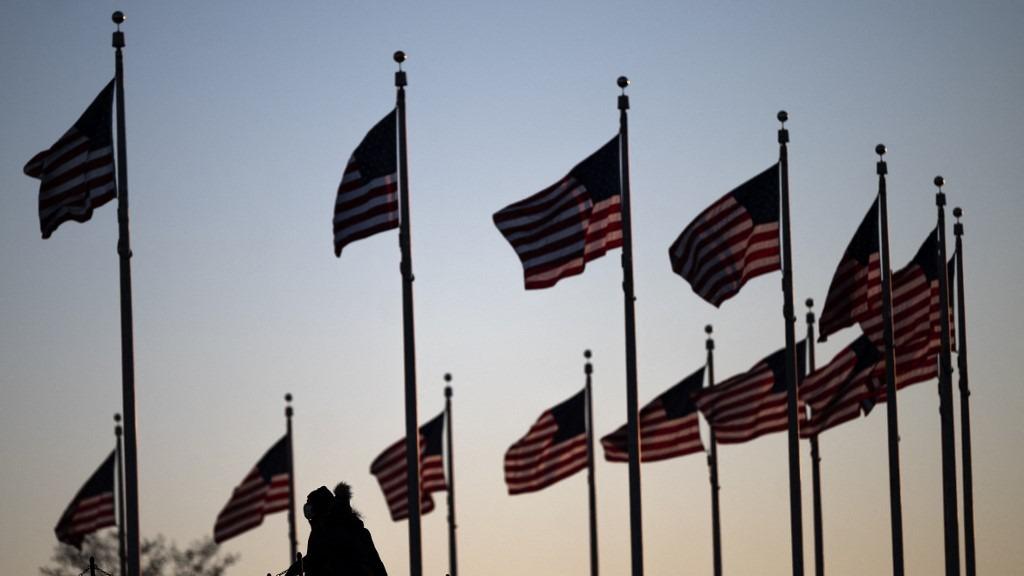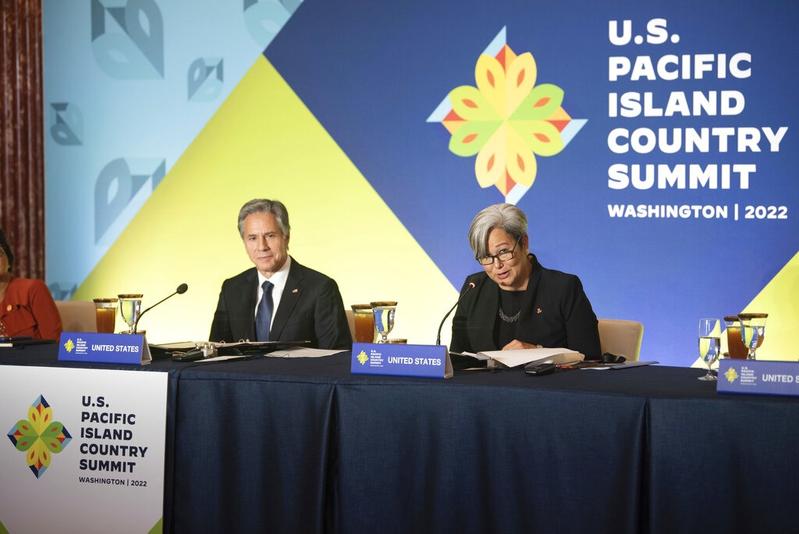 People pass by US National flags in Washington, DC on Jan 9, 2021. (ANDREW CABALLERO-REYNOLDS / AFP)
People pass by US National flags in Washington, DC on Jan 9, 2021. (ANDREW CABALLERO-REYNOLDS / AFP)
With the US hosting a summit of Pacific island leaders this week, some experts are questioning whether Washington’s objective is to treat the nations as part of a geopolitical strategy rather than as partners.
“The US tends to see all policy actions through the geostrategic and national security lens,” Sourabh Gupta, a senior fellow at the Institute for China-America Studies in Washington, told China Daily.
The US tends to see all policy actions through the geostrategic and national security lens ... As such, the Pacific island countries, despite having a population of less than 10 million, are first and foremost seen as ramparts constituting the second-island chain line of defense. For China, on the other hand, these countries are development partners.
Sourabh Gupta, senior fellow at the Institute for China-America Studies in Washington
“As such, the Pacific island countries, despite having a population of less than 10 million, are first and foremost seen as ramparts constituting the second-island chain line of defense. For China, on the other hand, these countries are development partners.”
President Joe Biden was scheduled to host the summit in Washington on Wednesday and Thursday. Officials and analysts say that the United States is looking to strengthen ties with the islands by demonstrating its commitment.
“Left to their own choices, the Pacific island states would much prefer to see themselves not as strategic pawns but as partners tackling the development and climate change challenges facing the South Pacific,” Gupta said.
ALSO READ: US to host meeting of Indo-Pacific trade, economic ministers
Gupta detailed what he believes are the US’ motivations during the summit: “First, it will convene more such summits with the Pacific countries to maintain institutionalized continuity. Next, it will have senior and midlevel diplomats show up more often in the region to communicate its interest and commitment.
Third, it will try to crowd-in allies as co-partners in the capacity-building of these Pacific island nations. All fine and good. But the real test will be in the staying power — or lack of — the US’ commitment.”
Patricia Kim, a Brookings Institution fellow, wrote in a blog post that the US has been criticized for overlooking the Solomon Islands and coming “too late to the region”.
Zongyuan Zoe Liu, a fellow at the New York-based Council on Foreign Relations, said in an article carried by the Honolulu Civil Beat website that this is the first Pacific island summit held by a US administration, which “just goes to show the region from a historical perspective has not been our top priority”.
US Vice-President Kamala Harris acknowledged that the US may not have provided the diplomatic attention the region deserved in a virtual address to the Pacific Islands Forum in Suva, Fiji, in July.
READ MORE: US seeks to ramp up Pacific Islands presence with new initiatives
 East-West Center President Suzanne Puanani Vares-Lum (left) speaks at the US-Pacific Island Country Summit with Secretary of State Antony Blinken at the State Department in Washington on Sept 28, 2022. (KEVIN WOLF / AP)
East-West Center President Suzanne Puanani Vares-Lum (left) speaks at the US-Pacific Island Country Summit with Secretary of State Antony Blinken at the State Department in Washington on Sept 28, 2022. (KEVIN WOLF / AP)
Nuke tests destination
In an opinion article under the headline “The US should get real about history and colonialism before China does”, Akhil Ramesh, a consultant to the EastWest Institute, said that the Western countries have historically siloed the Pacific island nations as tourist destinations, sources of mineral and natural resources, and even as a destination for nuclear tests.
A fundamental problem in US-Pacific dialogue is that island leaders do not regard China as a threat to their security and do not find US references to ‘rules-based order’ or ‘bad actors’ particularly relevant ... Pacific leaders prefer to be engaged on their own terms rather than as part of a wider endeavor to counter China.
Terence Wesley-Smith, professor emeritus in the Center for Pacific Islands Studies at the University of Hawaii in Manoa, and Gerard Finin, former director of the Pacific Islands Development Program at the East-West Center in Hawaii
“The US conducted 67 nuclear tests in the Marshall Islands from 1946 to 1958, leading to health and environmental consequences that continue to affect residents today. Those tests include the ‘Castle Bravo’ bomb at Bikini Atoll in 1954 — which is the largest thermonuclear detonation ever conducted by the US,” he wrote, saying that the Biden administration should “revisit its understanding of history”.
According to United Nations Comtrade data, most Pacific island nations’ two-way trade with China overtook the flows with Australia from 2013.
Data released by Australia’s Lowy Institute showed that China provided close to US$1.5 billion in foreign aid to the Pacific islands region in grants and loans between 2006 and 2017.
Because of their location, Pacific island nations usually see the climate as a top priority.
At the Pacific Islands Conference of Leaders held in Honolulu two weeks ago and attended by more than 10 leaders of Pacific island nations and territories, Gerald Zackios, the Marshall Islands’ ambassador to the US, stressed “the existential threat that climate change poses”.
READ MORE: Washington slammed over Solomons remark
“A fundamental problem in US-Pacific dialogue is that island leaders do not regard China as a threat to their security and do not find US references to ‘rules-based order’ or ‘bad actors’ particularly relevant,” Terence Wesley-Smith and Gerard Finin wrote in an article published on the website of the Development Policy Center, an Australian think tank.
Wesley-Smith is a professor emeritus in the Center for Pacific Islands Studies at the University of Hawaii in Manoa, and Finin is a former director of the Pacific Islands Development Program at the East-West Center in Hawaii.
“Pacific leaders prefer to be engaged on their own terms rather than as part of a wider endeavor to counter China,” they wrote.


